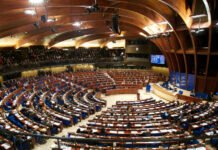Elections in Turkey on Sunday were well managed and offered voters a choice between genuine political alternatives, but President Recep Tayyip Erdoğan and the ruling parties enjoyed an unjustified advantage, international observers representing the Organization for Security and Co-operation in Europe (OSCE) and the Parliamentary Assembly of the Council of Europe (PACE) said in a statement today.
International observers from PACE, the OSCE Office for Democratic Institutions and Human Rights (ODIHR) and the OSCE Parliamentary Assembly (OSCE PA) monitored the May 14 presidential and parliamentary elections in Turkey.
The presidential election will be decided in a runoff, after incumbent President Erdoğan pulled ahead of his chief challenger Kemal Kılıçdaroğlu, leader of the main opposition Republican People’s Party (CHP), but fell short of an outright victory that would extend his rule into a third decade.
The joint international observation mission found that the legal framework does not fully provide a basis for holding democratic elections.
“These were competitive but still limited elections, as the criminalization of some political forces, including the detention of several opposition politicians, prevented full political pluralism and impeded individuals’ rights to run in the elections,” said Michael Georg Link, special coordinator and leader of the short-term OSCE observer mission. “Political interference in the electoral process is not in line with Türkiye’s international commitments.”
Almost 61 million voters were registered to vote in the country as well as 3.5 million abroad, in an election that took place against the backdrop of devastating earthquakes in early February.
“Turkish democracy is proving to be amazingly resilient. This election had a high turnout and offered a real choice. However, Türkiye does not fulfil the basic principles for holding a democratic election,” said Frank Schwabe, head of the PACE delegation. “Key political and social figures are in prison even after judgments of the European Court of Human Rights, media freedom is severely restricted and there is a climate of self-censorship. Türkiye is a long way from creating fair election campaign conditions.”
According to the joint mission, misuse of public resources in some cases as well as announcements of significant social benefit programs provided undue advantage to those in power and blurred the line between party and state.
The joint mission included 401 observers from 40 countries, made up of 264 ODIHR-deployed experts, long-term and short-term observers, 98 from the OSCE PA and 39 from PACE.














